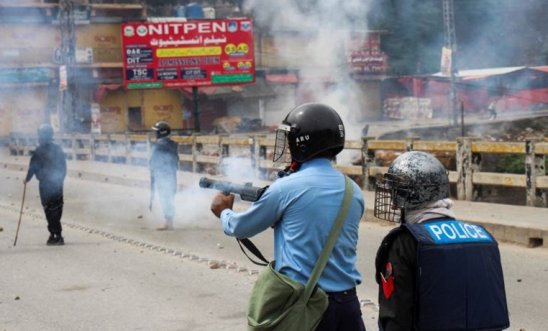
Unrest in Azad Kashmir: Repeating pattern of Gen-Z voices raised in anger

Written by Cherry Bird, Country Coordinator for India
Once again young people have taken to the streets to voice long festering frustrations. Corruption, inequality, privilege for the few, lack of jobs, spiralling prices – a familiar scenario. And once again, the authorities waded in with a heavy hand, using violent means to disperse peaceful protests and shutting down communications to crush dissent. At least nine people were killed and dozens injured on the streets of Muzaffarabad in Azad Kasshmir, a semi-autonomous state within Pakistan Administered Kashmir. In September it was Nepal, where Gen-Z protesters succeeded in bringing down the government. Earlier in the year there were major protests in Indonesia and The Philippines, in 2024, students unseated the government in Bangladesh. This October it was the turn of Azad Kashmir. The context may be slightly different, but the essential story is the same. A new educated generation that is not going to take no for an answer and has reached the end of the road.
In Azad Kashmir, access to the traditional avenue of working abroad has become increasingly difficult due to restrictions imposed by the authorities on obtaining passports, travel permits and “No Objection Certificates” (NOC). Said to be for “security reasons”, these restrictions are often used to limit dissent and applied in ways that hinder travel for those with political or family connections to activities deemed sensitive by the authorities. Meanwhile insufficient job opportunities at home, a spiralling cost of living and increased poverty have resulted sharp increases in mental health problems and drug abuse among a population that is more educated than ever before and can see via social media that life is not like this for everyone.
Led by the Jammu & Kashmir Joint Awami Action Committee (JAAC), an umbrella organisation representing traders and civil society groups that has emerged as the voice of grassroots discontent across the region, young people instigated major street action, based on a 38-point set of demands. These ranged from providing free education and healthcare facilities and launching major infrastructure projects to changing the structure of the provincial legislature to remove “corrupt officials”. The government imposed a communications blackout, cutting residents off from all mobile telecommunications. This is the latest escalation in a two-year confrontation between the government and a grassroots movement that has shown its street power on several occasions. After a 5-day lockdown the government agreed to some of the demands, but there is no guarantee anything will change in the longer term.
Meanwhile, a long-standing issue is exploitation by the Pakistan government of the natural resources of the region to benefit the population of Pakistan, including timber from its extensive forests, minerals and major hydropower projects. This means the loss of good farm land with no benefits to local population, and an associated drop in income from farming activities, such as the sale of apples, previously a mainstay of the rural economy. One stark example is the Mangla Dam, a massive hydropower project built in 1967 on prime farmland and submerging 280 villages, including the towns of Mirpur and Dadyal. Over 110,000 residents were displaced. Pakistan promised the local population compensation in the form of royalties, free electricity, and even free water supply to Mirpur, but these promises were never fully honoured. With an installed capacity over 1,000 MW, Mangla produces abundant power, but almost all is fed into Pakistan’s national grid. Local people were told they would receive 300 MW free of charge to meet their needs, but have received nothing. Instead, ironically, residents of Azad Kashmir must purchase their electricity at higher tariffs than those in Pakistan’s provinces. Islamabad effectively treats power from Azad Kashmir as an “import” – sold to locals at 20-40 times the token rate it pays. Unlike Pakistan’s provinces, Azad Kashmir is denied any hydropower royalty under Pakistan’s constitution, meaning the region gets no compensation for hosting dams on its soil.
Not surprisingly there is resentment.
An Amnesty International statement said that “The situation in Pakistan-administered J&K was preventable and now the priority of the authorities must be to ensure there are no further injuries or loss of life. There should also be an immediate, impartial and transparent investigation into all incidents of deaths and injuries, including investigating the excessive use of force by law enforcement, and all those responsible must be held to account. This is not the first time the authorities have cracked down on peaceful protests in the region. Pakistani authorities have a positive obligation under international human rights law to respect the right to peaceful assembly and to facilitate and protect peaceful protesters.”
Based on conversations with people from Azad Kashmir and articles published by Al Jazeera and European Times
Our blogs are written by Amnesty International staff, volunteers and other interested individuals, to encourage debate around human rights issues. They do not necessarily represent the views of Amnesty International.
0 comments